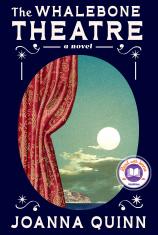Reading Group Guide
Discussion Questions
The Whalebone Theatre

1. What do we learn about Cristabel, from the time she is a child, that indicates her affinity for Shakespeare? Consider her reflection: “Cristabel has always wanted her life to be a story…. Uncle Willoughby was the first to insist upon the importance of her own behaviour and the first to suggest that she could leave an impression on the world, which meant that she existed” (426).
2. The Seagrave children are bound together by death from the start --- from the loss of Annabel, to Jasper, to Rosalind, to Willoughby (in presence). How does the lack of parental stability shape how they grow into their adulthood?
3. The cottage on the Chilcombe property is described as “a house of flora and fauna; half consumed, half alive” (142). How does the estate grow and evolve over the course of the novel, alongside the human characters? What characteristics would you give this home, if you were to describe it as a person?
4. How do the pressures of inheritance affect the Seagrave men differently --- from Jasper to Willoughby to Digby? What is inherited, and by whom, by the end of the war, regardless of gender?
5. Rosalind enters Chilcombe as a veritable outsider --- upon her arrival on the first day of 1920, we learn that “Rosalind feels pinned beneath the sheets of the marital bed.... She is fixed in place. An exhibit.... Jasper believes she will become familiar with her marital duties in time. She will become familiar with the unfamiliar” (11). How does the establishment of the Whalebone Theatre integrate her in the family in a new, even unexpected way? What do you think would have been different about how the family and estate went through the war had she not died?
6. The arrival of the whalebones at Chilcombe is an event in and of itself. What is the significance of taking something that technically “belongs to the king” (197)? Did the transformation of the theatre into a garden during the war actually change anything about what the theatre is being used for by the family?
7. The children’s decade of plays, from 1928 to 1938, is condensed in a single chapter at the end of Act Two in the novel, in the form of local news reviews. How did this distanced presentation of the events of the Whalebone Theatre shape your impression of the actual theatre they put on? What room did this leave for the reimagining of the theatre’s work after the war?
8. The novel combines many modes of writing --- prose, dialogue/drama, letters, diary entries, reviews, shaped prose, etc. How did this presentation enhance the meaning of a given scene, conversation or relationship? Consider the scene when Rosalind dies in the night club, on pp 278-80.
9. Discuss the way that Taras sparks the children’s creativity and imagination. How does he complicate the male presence in their lives up until that point?
10. Cristabel, Digby and Flossie all take on heroic roles in their own way during the war. How do you think their experience of acting in Shakespeare plays as children prepared them for these impactful roles? Which context --- theatre or life --- was more “real” to them? Consider the description of Paris as liberation begins: “It is like a carnival, with all its gaiety and danger. Nothing was happening and now anything might happen. All things are ending and beginning at once. Everything they have hoped for” (517).
11. During the war, Cristabel and Digby take on personas that are necessary for them to stay alive, and to keep others alive. What satisfaction, and risk, do they derive from doing so? How do they continue to reinvent themselves after the war, even beyond life?
12. What do we learn about Cristabel and Digby through their letters, sent and unsent? What’s unique about their relationship, including Cristabel’s notion that she “willed [him] into being” (524)?
13. Besides being a major site of conflict for the war efforts, Paris has a specific character that’s distinctive from how the war is felt in England. How would you compare the two? Which provides more artistic inspiration and growth for the characters who occupy those locations?
14. Women take on various responsibilities in the war --- on the field and at home, and yet as Perry says of the female spies, “If we circulate the details of women agents in an effort to find them, it means admitting they were there” (536). How does this reflect the general attitude toward women throughout the timeframe of the novel? How do the main women --- Cristabel, Rosalind, Flossie --- defy being forgotten in the way that establishments might want them to be?
15. In what ways does war, and generally the threat of death, create the conditions for love to blossom throughout the novel? Consider the relationships between Rosalind and Jasper (and Willoughby), Cristabel and Leon, Flossie and George, and Digby and Jean-Marc. Which of those pairs do you think would have been possible in other contexts?
16. Why do you think the novel is broken into “Acts” as a structural device? How do the novel’s events map onto the typical five-part structure of a Shakespeare play?
17. Compared to other novels or stories about World War II you may have encountered, what was unique about this story? Why do you think this period in history has yielded so many different artistic representations? Does your family, or anyone you know personally, have a connection to WWII that you thought of while reading?
The Whalebone Theatre
- Publication Date: October 4, 2022
- Genres: Fiction, Historical Fiction
- Hardcover: 576 pages
- Publisher: Knopf
- ISBN-10: 0593321707
- ISBN-13: 9780593321706







